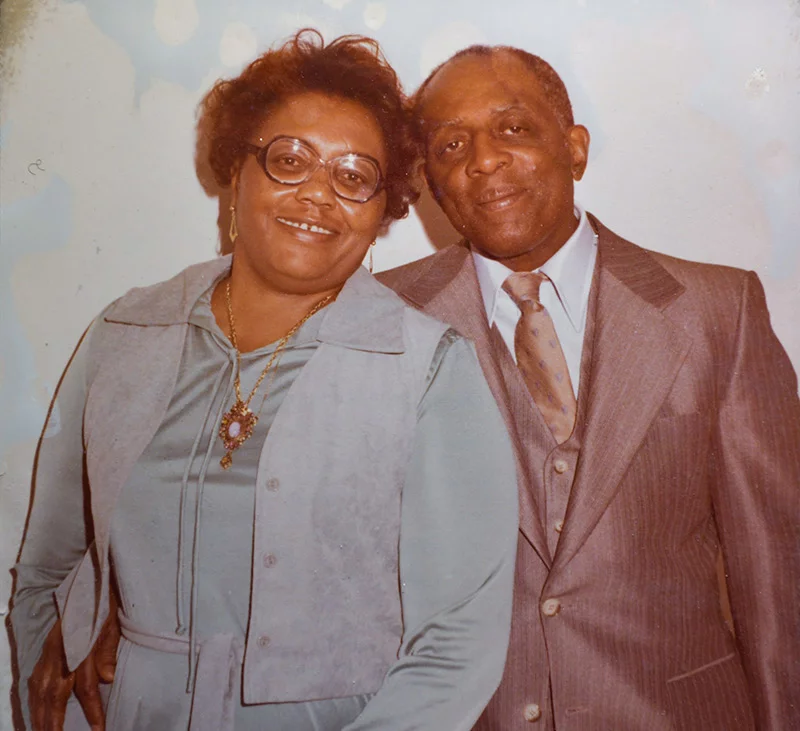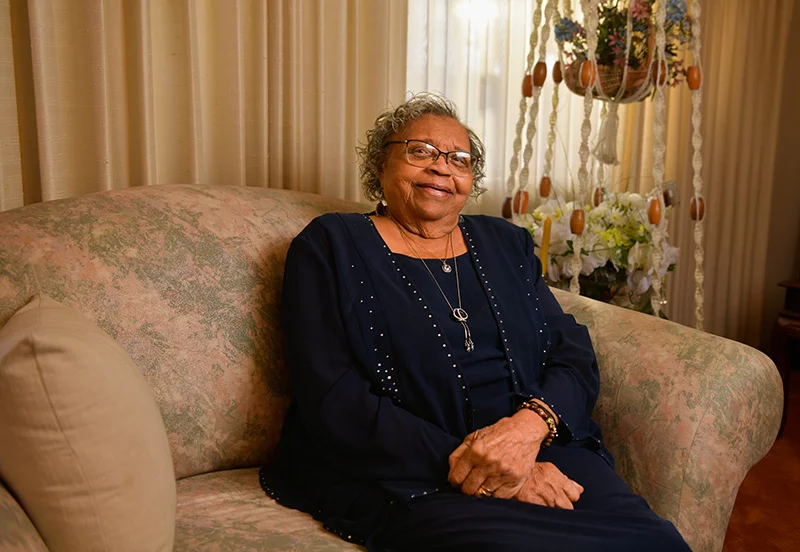
Nearly 80 years after Hattie Smith left Mississippi behind as a young bride, she returned one last time to find the small cemetery where her parents were buried, surrounded by cotton fields like the ones she harvested long ago as the daughter of sharecroppers.
“I hated to leave them,” Hattie, 96, said of her final farewell to her parents’ graves in her hometown of Tchula.

“I was not ready to go, and seeing their graves made me sad. But after a while, I got happy again. I told them, ‘This is my last trip. I won’t be back anymore.’ ”
In early October, Hattie and her niece, Janice Turner, boarded a plane for Jackson, Miss. on a three-day, all-expense paid trip funded by AARP’s Wish of a Lifetime.
Hattie’s yearning was elicited by her longtime UCHealth geriatric nurse practitioner Maria Vejar, who posed a single, simple question to her patient last June: “If you had a wish, what would it be?”
Hattie replied: “To visit my parents’ grave one last time.”
Vejar recommended Hattie for Wish of a Lifetime, which she had learned about through the University of Colorado Anschutz Multidisciplinary Center on Aging. Vejar then turned to dedicated staffers with the UCHealth Volunteer Patient Navigator Program who worked for several months to formally nominate Hattie and make her dream a reality.
Small town, big dreams

Hattie’s journey from Mississippi to Colorado had many zigs and zags since she was born in 1926, one of 10 siblings raised on a plantation outside Tchula, about an hour south of Jackson. It’s a rural farm town of fewer than 2,000 residents, fertile land that grew cotton for centuries harvested by slaves and then Black sharecroppers who were denied the right to own the land they farmed. The area’s Black residents have had to struggle for many generations against the racist legacy of slavery and Jim Crow.
Hattie recalls working in the plantation fields: the long hot days and how she quickly learned to separate the central fluffy cotton bud from the sharp thorns of the plant itself.
Her parents, Lee and Parrena, along with their children, sharecropped the land for white farm owners, mainly picking cotton along with some corn.
“I liked it alright because I didn’t know anything else; I didn’t know anything different,” she said from the Denver home where she lives independently, surrounded by scores of family photos, mementos and memories of a full life, well lived.

Things changed when Hattie was 15 and her parents left the plantation and moved to Tchula, where they bought a house and rented out the one next door to a couple who, unbeknownst to Hattie, would become her in-laws several years later.
As luck would have it, the couple’s son, a handsome WWII Army veteran named Johnnie Smith, came home after the war to visit. He and Hattie were smitten from the get-go and 10 weeks later they were married – a union that would last nearly 50 years until his death in 1994.
“He was such a nice person, I couldn’t let him go,” she said.

Pushing to make Denver better for all
After they were married, Johnnie headed back to post-war Germany and Hattie left Mississippi to stay with relatives in Chicago. As Johnnie was a career military man, she experienced several moves during the early years of their marriage: California, and then time in Denver while he was stationed at Denver’s Fitzsimons Army Base, (now the site of Fitzsimons Life Sciences District and the Anschutz Medical Campus). He was one of the first groups of Black soldiers to be barracked there, and their oldest son, Doyce, became the first Black child to be born at the former Fitzsimons Army Hospital.
They settled in Denver for a while and two more boys, Delbert and Kelvin came along. Hattie and the boys temporarily moved to Chicago when Johnnie was sent to Japan and then they joined him – which meant a 30-day overseas trip during which Hattie had to corral her little ones on the ship’s deck. But she was game and enjoyed the adventure, as she fondly remembered their stint overseas was the first and only time she had a housekeeper.
But when Johnnie came down with tuberculous in 1954, the family left Japan as he was sent back to Fitzsimons for extensive lung treatments that lasted a year. Hattie set out to make Denver a permanent home for their family, though those early days in the city were not easy.
“It was rough raising the children during that time by myself while he was in the hospital,” she said. “Johnnie couldn’t really see them much because of his health. But we did our best.”
In addition to dealing with TB, the couple pushed back against the city’s discrimination policies. These included “redlining,” where racist zoning and home loaning practices prohibited Black families from moving into certain parts of Denver.
Yet Hattie was not easily dissuaded. It would take a few years, a few moves, and a few houses, until the Smiths reached a neighborhood Hattie was satisfied with, a place she has called home since 1956.

Relatives soon found themselves moving to Denver and “Aunt Hattie” was the welcoming go-to for babysitting and delicious meals, as she was becoming the matriarch of the family.
Johnnie served a stint in Korea before leaving the Army after almost 30 years and then going to work and eventually retiring, from General Motors. For Hattie those years included becoming a key member of the community through her church, civic affairs and her sons’ schools.
She was a big backer of Hiawatha Davis Jr., a former Denver City Council member known for his fight against racism and poverty, and Arie Parks Taylor, a Black state legislator and business leader who broke through many racial barriers.
Like Hattie.
“She is very independent,” Janice said. “She is a homemaker. She is God fearing. She’s very giving. She loves her family more than anything in this world.”
Faith and Facebook
A woman of strong faith, Hattie can now boast to being the oldest, and longest-serving parishioner of Denver’s Central Baptist Church, founded by African Americans in 1891. She never misses a service.
“I love the Lord — he’s the only one that keeps me going for 96 years,” she said.

If Hattie can’t get to church, which occurred during the COVID-19 pandemic, the church comes to Hattie on Zoom via her ever-present iPad. Hattie has tech skills that people half her age would envy. She plays solitaire, blackjack and sudoku, Facetimes with loved ones and converses frequently with friends on Facebook.
All 737 of them. With more friend requests coming daily.
“I think I wore out two of these,” she said with a laugh while she navigates her iPad screen. “The old one took too long to charge, so my granddaughter got me a new one.”
Her granddaughter, Caryl Smith Gilbert, would spend summers with Hattie, where she learned to cook, keep house and “be a lady.” Later, Caryl would go on to become an all-star high school and college track athlete and a stand-out collegiate track and field coach, helming teams that attained national championships.
Caryl looks to her grandmother as the role model for her own trailblazing.
“She’s so strong: She’s lost her husband. Her children. Her siblings. I asked her, ‘How do you do this, how do you go on?’ And she said, ‘God’.”
Hattie has another grandchild, Mandingo Cooper. He’s a teacher, writer and producer in Atlanta.

Hattie Smith holds a photo of her beloved parents. Photo by Cyrus McCrimmon for UCHealth.
Back to Mississippi
The night before her trip, Hattie was so excited that she couldn’t sleep. Her church had hosted a sendoff complete with prayers and blessings; she’d had her hair and nails done at a salon, and Janice — along with UCHealth staff and volunteer navigators — worked to ensure she would be safe and healthy on the trip with the portable oxygen concentrator she uses.
“It took a whole village,” recalled Kathy Kriner, a volunteer with The Volunteer Patient Navigator Program who filled out Hattie’s application to Wish of a Lifetime and helped shepherd the process to completion.

The Volunteer Patient Navigator Program was created in 2017 to connect UCHealth patients to community resources and eliminate barriers to care. While it went dormant in 2020 because of COVID challenges, it returned in the spring. Since then, hundreds of patients at six different outpatient clinics have been helped.
“Hattie’s wish was particularly heartwarming,” Kriner said. “It was wonderful helping her do something that was so meaningful to her.”
Once Hattie and Janice made their way to Tchula in the rental car, it was as if the entire town showed up to welcome them back.

But before the celebration, a group of loved ones set out to find the cemetery. It took some time driving down long-familiar roads to find the graves of Lee and Parrena Ford, as they had been damaged by farm equipment and weather. Then Hattie spotted them in a small plot of land, circled by harvested cotton fields growing all around.
“It was amazing,” Janice said. “She didn’t need her walker or her cane. She felt energized all of a sudden and she stood up and walked over to them.”
It was a solemn moment as they came together and sang a church hymn.
“I just prayed and kept saying, “Thank you Lord, thank you Lord,’’ Hattie said.
Then it was time to leave and gather with family, friends and neighbors to eat the “feast” they had prepared for Hattie’s return.
“When it was time to go, I was all right. I didn’t want to see any more cotton. At first, it makes your hands sore, but after a while, it makes them tough.”
Like Hattie.
Returning and closure
The trip brought a sense of peace to Hattie.
But that was the past, and this 96-year-old is very much a woman of today. A longtime Broncos fan (she’s been a season ticket holder since 1965), and a Nuggets enthusiast too, she follows both teams closely, as well as the World Wrestling Federation. She cooks her own meals and loves to talk about her wonderful neighbors and relatives, both near and far.
Those who are fortunate enough to share Hattie’s orbit consider themselves to be the lucky ones.

“When I talk to her, she’s the highlight of my day,” said Vejar the geriatric nurse practitioner who has been seeing Hattie since 2008 at the UCHealth Seniors Clinic – Anschutz Medical Campus. “She’s just amazing and a special soul. She’s been through a lot, and to wake up each day and see such beauty in life and with a grateful heart…it’s so inspiring.”
Vejar, who checks in on Hattie regularly, had no idea that the question she asked those many months ago would end up leading Hattie to Mississippi.
“I really wasn’t expecting that. That that would be her wish. It was just meant to happen. Everything was meant to happen, and I’m so happy it happened to her.”
Though she’s lost many people in her life: her siblings, her husband, her three sons, Hattie pushes on. Aside from some minor health issues, she is spry and her mind is sharp.
“I keep myself busy. I’m happy to be living this life. It’s a blessing. I just ask the Lord to help me. That’s the only way you can get through this life.”
